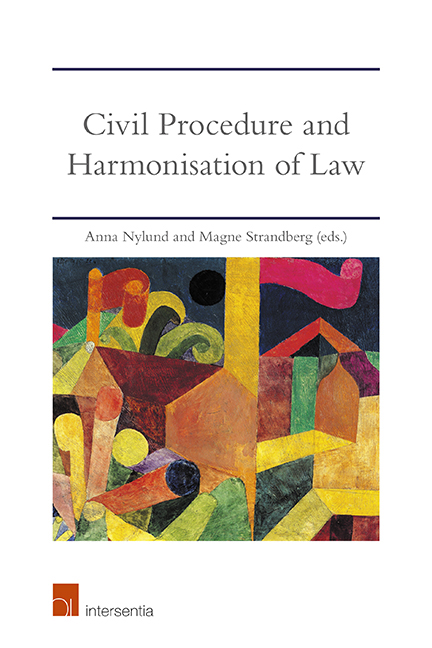Book contents
- Frontmatter
- Preface
- Contents
- List of Contributors
- List of Abbreviations
- Introduction
- EU Civil Justice at the Harmonisation Crossroads?
- The ELI-UNIDROIT Project: An Introduction and an English Perspective
- Europeanisation of Civil Procedure: Overcoming Follow-Up Fragmentation through Bottom-Up Harmonisation?
- Harmonisation or Fragmentation of National Law? An East Nordic Perspective
- An Examination of the Influence of European Union Law on English Civil Procedure
- The EU's Influence on Norwegian Civil Procedure through National Substantive Law
- Consumer Protection and EU-Driven Judicial Activism in the Netherlands
- The Role of the Judge in Consumer Cases – A German Perspective
- Ex Officio Application of the Unfair Terms Directive Cases against Consumers: A Swedish Perspective
- Ex Officio Application of EU Consumer Protection Law in Norwegian Courts
- Maintenance and Multi-Level Harmonisation: A European Union Perspective
- Family Maintenance and Multi-Speed Integration: A Norwegian Perspective
- Conclusions on Civil Procedure and Harmonisation of Law
- About the Editors
The Role of the Judge in Consumer Cases – A German Perspective
Published online by Cambridge University Press: 30 March 2019
- Frontmatter
- Preface
- Contents
- List of Contributors
- List of Abbreviations
- Introduction
- EU Civil Justice at the Harmonisation Crossroads?
- The ELI-UNIDROIT Project: An Introduction and an English Perspective
- Europeanisation of Civil Procedure: Overcoming Follow-Up Fragmentation through Bottom-Up Harmonisation?
- Harmonisation or Fragmentation of National Law? An East Nordic Perspective
- An Examination of the Influence of European Union Law on English Civil Procedure
- The EU's Influence on Norwegian Civil Procedure through National Substantive Law
- Consumer Protection and EU-Driven Judicial Activism in the Netherlands
- The Role of the Judge in Consumer Cases – A German Perspective
- Ex Officio Application of the Unfair Terms Directive Cases against Consumers: A Swedish Perspective
- Ex Officio Application of EU Consumer Protection Law in Norwegian Courts
- Maintenance and Multi-Level Harmonisation: A European Union Perspective
- Family Maintenance and Multi-Speed Integration: A Norwegian Perspective
- Conclusions on Civil Procedure and Harmonisation of Law
- About the Editors
Summary
INTRODUCTION
DICHOTOMY OF INTERESTS: IMPARTIALITY VS. CONSUMER PROTECTION
The position of judges in consumer cases is oft en inconvenient: they are torn in two different directions by two different sets of legal rules. On the one hand, procedural law requires them to be impartial: they must not grant any support to either one of the parties. On the other hand, substantive law itself is not impartial, but clearly sides with the consumer. The reason for this partiality is quite evident: it is an attempt to compensate for the at least potential imbalance in power and knowledge between a consumer and a professional.
It is not my intention in this chapter to question the premise that there is, normally, indeed such an imbalance in power. Instead, I focus on the question of what it means for the judges ‘role in consumer cases if we accept that premise. Is it sufficient for the substantive law to try to compensate for the imbalance so that the judge can stick to his role as an impartial entity? Or must the judge contribute to the goal of consumer protection and support the consumer in the proceedings, and if so, to what extent?
DICHOTOMY OF LEGAL SOURCES: EUROPEAN LAW AND NATIONAL LAW
In large part, these questions cannot be answered solely from a German perspective. This is simply because the German perspective is not crucial. Europe has taken over: consumer law is one of the core areas of EU legislative competence. Whenever substantive law is penned by the European legislator, the perspective of national procedural law suffers a certain decline in relevance. It must adhere to the targets set in Brussels (or in Luxembourg, where relevant). However, since my intention is to discuss not the European perspective but rather the German one, I have primarily restricted myself to the question of whether German rules of civil procedure actually meet European targets. Having answered this question, however, I turn to those remaining areas of law that are not shaped by European targets (yet) and in which the domestic German perspective therefore remains crucial.
- Type
- Chapter
- Information
- Civil Procedure and Harmonisation of LawThe Dynamics of EU and International Treaties, pp. 141 - 152Publisher: IntersentiaPrint publication year: 2019



